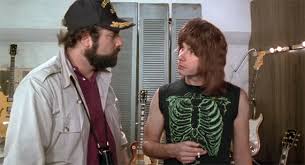The Weekender, April 21, 2017

1) “For 18 years, I thought she was stealing my identity. Until I found her ” (The Guardian, 16 minutes, April 2017). At least a half-dozen readers suggested this one — it’s that good.
The clerk said that I’d have to go the department of motor vehicles (DMV). So, slightly humiliated, I called Gramma from the payphone to pick us up.
At the DMV the next week, I was told that I’d gotten a ticket for driving down 138th Street in the Bronx with a busted headlight. “That can’t be,” I said. “I’ve never even driven down that street.”
They showed me a copy of the ticket. It was made out to Lisa Selin Davis. But the address wasn’t mine. The car wasn’t mine. And the neat, bubbly signature on the bottom – Lisa Davis, in cursive – wasn’t my all-caps scrawl. It must be identity theft, I thought.
[ . . . ]
Finally, the DMV told me that I wasn’t the victim of identity theft; there was simply another Lisa S Davis with the same birthday in New York City. Our records were crossed. When cops run a license, they don’t check the person’s address, signature, or social security numbers. They check the name and the birthday, and both the other Lisa S Davis’s and mine were the same. We were, in the eyes of the law, one person, caught in a perfect storm of DMV and NYPD idiocy.
2) Support Now I Know: Last week, I asked you to consider supporting Now I Know on Patreon in hopes of hitting 400 supporters. Well, THANK YOU! I hit the milestone over the last week, and with your help, Now I Know is becoming increasingly sustainable.
3) The Now I Know Week in Review:
- Monday: Grand Theft Auto, Pyongyang — North Korea has a lot of Volvos. Here’s why Sweden isn’t happy about that.
- Tuesday: A Sparkly Way to Solve a Crime — why crime scene investigators keep an eye out for glitter.
- Wednesday: Bad-Minton — the very weird story of the Olympic matches no one wanted to win.
- Thursday: The Nose Knows — Disney’s smell-centric marketing scheme.
And a bonus item: Classifried — how the CIA celebrated Earth Day.
4) “This Lawsuit Goes to 11” (Bloomberg Businessweek, 14 minutes, April 2017). I usually save the last slot for the sports/entertainment stories but this one combines one of my favorite movies, This is Spinal Tap, with one of the worst features of the movie industry, “Hollywood accounting.”
It’s hard to think of another movie from the past 50 years that’s had a bigger impact on modern comedy. Spinal Tap pioneered a mock-doc genre that’s influenced everything from the long run of improvisational films directed by Guest (Waiting for Guffman and Best in Show among them) to docu-styled sitcoms such as The Office and Modern Family. This made it all the more surprising when, about four years ago, Shearer became the first of his fake bandmates to learn lesson No. 2 in Hollywood: No matter how well your movie does, there’s no such thing as net profit.
WeeeknderAdUnits
5) “The Dark Secret at the Heart of AI” (Technology Review, 14 minutes, April 2017). The subhead: “No one really knows how the most advanced algorithms do what they do. That could be a problem.”
Last year, a strange self-driving car was released onto the quiet roads of Monmouth County, New Jersey. The experimental vehicle, developed by researchers at the chip maker Nvidia, didn’t look different from other autonomous cars, but it was unlike anything demonstrated by Google, Tesla, or General Motors, and it showed the rising power of artificial intelligence. The car didn’t follow a single instruction provided by an engineer or programmer. Instead, it relied entirely on an algorithm that had taught itself to drive by watching a human do it.
Getting a car to drive this way was an impressive feat. But it’s also a bit unsettling, since it isn’t completely clear how the car makes its decisions. Information from the vehicle’s sensors goes straight into a huge network of artificial neurons that process the data and then deliver the commands required to operate the steering wheel, the brakes, and other systems. The result seems to match the responses you’d expect from a human driver. But what if one day it did something unexpected—crashed into a tree, or sat at a green light? As things stand now, it might be difficult to find out why. The system is so complicated that even the engineers who designed it may struggle to isolate the reason for any single action. And you can’t ask it: there is no obvious way to design such a system so that it could always explain why it did what it did.
6) “How Google eats a business whole” (The Outline, 11 minutes, April 2017). In 2008, a guy who wanted to create a somewhat authoritative website cataloging the net worth of famous people created CelebrityNetWorth.com. A few year later, Google changed how it displays information, effectively killing the website while giving worse information. This is that story.
Have a great weekend!

